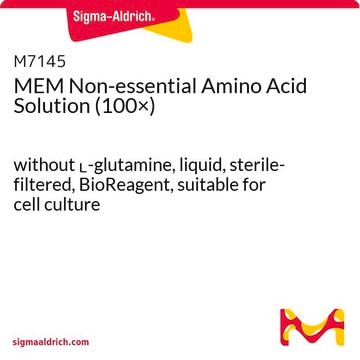RPTMAG-86K
MILLIPLEX® Rat Pituitary Magnetic Bead Panel - Endocrine Multiplex Assay
The analytes available for this multiplex kit are: ACTH, BDNF, FSH, GH, LH, Prolactin, TSH.
About This Item
Recommended Products
Quality Level
species reactivity
rat
manufacturer/tradename
Milliplex®
assay range
accuracy: 75%
(GH)
accuracy: 88%
(ACTH)
accuracy: 89%
(LH)
accuracy: 90%
(TSH)
sensitivity: 0.38 pg/mL
(BDNF)
sensitivity: 0.87 pg/mL
(TSH)
sensitivity: 1.95 pg/mL
(ACTH)
sensitivity: 3.28 pg/mL
(LH)
sensitivity: 4.64 pg/mL
(Prolactin)
sensitivity: 6.50 pg/mL
(GH)
sensitivity: 7.62 pg/mL
(FSH)
standard curve range: 16-50,000 pg/mL
(GH, Prolactin)
standard curve range: 3.2-10,000 pg/mL
(ACTH, BDNF, LH, TSH)
standard curve range: 32-100,000 pg/mL
(FSH)
inter-assay cv: <20%
intra-assay cv: <10%
technique(s)
multiplexing: suitable
detection method
fluorometric (Luminex xMAP)
shipped in
wet ice
General description
MILLIPLEX® Rat Pituitary Panel is a 7-plex kit to be used for the simultaneous quantification of any or all of the following analytes in rat serum or plasma samples, rat tissue extract, or cell/tissue culture supernatant samples: Growth Hormone (GH), Thyroid-Stimulating Hormone (TSH), Adrenocorticotropic Hormone (ACTH), Luteinizing Hormone (LH), Prolactin, Follicle-Stimulating Hormone (FSH), and Brain-Derived Neurotrophic Factor (BDNF). This kit uses a 96-well format, contains a lyophilized standard cocktail, two internal assay quality controls and can measure up to 38 samples in duplicate.
The Luminex® xMAP® platform uses a magnetic bead immunoassay format for ideal speed and sensitivity to quantitate multiple analytes simultaneously, dramatically improving productivity while conserving valuable sample volume.
Panel Type: Endocrine
Application
- Analytes: Adrenocorticotropic Hormone (ACTH), Brain-Derived Neurotrophic Factor (BDNF), Follicle-Stimulating Hormone (FSH), Growth Hormone (GH), Luteinizing Hormone (LH), Prolactin, Thyroid-Stimulating Hormone (TSH)
- Recommended Sample Type: Rat serum, plasma, cell/tissue culture supernatants or lysates
- Recommended Sample Dilution: 25 μL per well 1:3 diluted serum or plasma; cell/tissue culture samples may require dilution in an appropriate control medium.
- Assay Run Time: Overnight (16-18 hours) at 2-8°C
- Research Category: Endocrine
- Research Subcategory: Metabolism
Features and Benefits
Legal Information
Signal Word
Danger
Hazard Statements
Precautionary Statements
Hazard Classifications
Acute Tox. 3 Dermal - Acute Tox. 4 Inhalation - Acute Tox. 4 Oral - Aquatic Chronic 2 - Eye Irrit. 2 - Skin Sens. 1
Storage Class Code
6.1C - Combustible acute toxic Cat.3 / toxic compounds or compounds which causing chronic effects
Certificates of Analysis (COA)
Search for Certificates of Analysis (COA) by entering the products Lot/Batch Number. Lot and Batch Numbers can be found on a product’s label following the words ‘Lot’ or ‘Batch’.
Already Own This Product?
Find documentation for the products that you have recently purchased in the Document Library.
Related Content
Multiplex toxicity assays enable researchers to simultaneously measure multiple toxicity biomarkers of various organs to gain a better understanding of toxicity. Explore how MILLIPLEX® multiplex toxicity assays are advancing research on liver injury, kidney toxicity, genotoxicity, and more.
Multiplex toxicity assays enable researchers to simultaneously measure multiple toxicity biomarkers of various organs to gain a better understanding of toxicity. Explore how MILLIPLEX® multiplex toxicity assays are advancing research on liver injury, kidney toxicity, genotoxicity, and more.
Multiplex toxicity assays enable researchers to simultaneously measure multiple toxicity biomarkers of various organs to gain a better understanding of toxicity. Explore how MILLIPLEX® multiplex toxicity assays are advancing research on liver injury, kidney toxicity, genotoxicity, and more.
Multiplex toxicity assays enable researchers to simultaneously measure multiple toxicity biomarkers of various organs to gain a better understanding of toxicity. Explore how MILLIPLEX® multiplex toxicity assays are advancing research on liver injury, kidney toxicity, genotoxicity, and more.
Our team of scientists has experience in all areas of research including Life Science, Material Science, Chemical Synthesis, Chromatography, Analytical and many others.
Contact Technical Service










